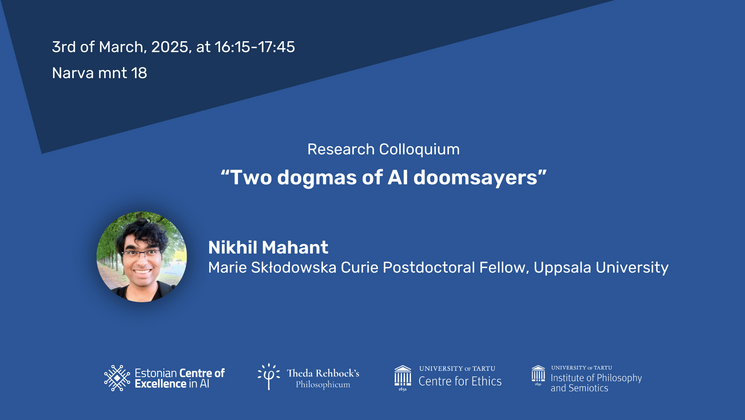Estonian IT researchers: we have a unique position to be a leader in secure Artificial Intelligence in Europe

On February 14, in Brussels, experts in artificial intelligence from Estonian and European universities, members of the European Commission, and technology attachés from member states gathered to discuss the development trends and opportunities for becoming a world leader in the field of secure artificial intelligence. The high-level seminar highlighted the strong commitment and vision of Estonian researchers to be pioneers in this field.
Tiit Lukk, Vice Rector for Research at Tallinn University of Technology, opened the seminar, emphasizing both the importance of the security issue of artificial intelligence and the competence of the consortium to address these issues. "Reliable artificial intelligence cannot be created from low-quality data using a 'garbage in, garbage out' principle. Functional artificial intelligence must be reliable and based on high-quality data and research," said Lukk. He added that the gathered researchers have the competence to ensure this and referred to other partner universities in the consortium, including the University of Tartu, Radboud University, and the Technical University of Munich.
In light of the artificial intelligence developments of the previous year, artificial intelligence security has become a priority for Europe. The European Union's artificial intelligence regulation, which came into effect in February, is a significant step, but both scientists and AI experts from the public and private sectors agree that the real work is still ahead.
Gabriele Mazzini, head of the European Commission's artificial intelligence working group, presented the European vision and the processes of development in drafting the regulation. "The European artificial intelligence regulation does not regulate the technology itself, but its applications," he emphasized. He noted that the development of artificial intelligence must be based on risk-based categorization and the application of new technologies must be in line with our fundamental values and rights to promote the creation of an innovative and secure environment.
Although the regulation is an important practical milestone in ensuring the security of artificial intelligence, it is clear that its implementation largely remains the responsibility of the member states. Estonian experts believe that Estonia is the right place to lead Europe in this field through cooperation between the private and public sectors and science, and by fostering a technological innovation ecosystem.
Why Estonia?
The presentation of the seminar was initiated by former Minister of Foreign Trade and Information Technology, Andres Sutt, whose presentation highlighted Estonia's advantages in developing a center for secure artificial intelligence. "We have been building a digital society for more than one generation. We have always been open to new technological challenges, which has enabled us to build the necessary ecosystem for the application of artificial intelligence in society," said Sutt, who also deals with industry issues at the Estonian AI and Robotics Center (AIRE).
He emphasized that the growing dependence on technology also requires greater investment in research capacity and resilience against potential threats, which can be achieved through research and development. "Engineering artificial intelligence security is one direction where I believe research should go," concluded Andres Sutt.
Pawel Sobocinski, professor at the TalTech School of IT, also had an enthusiastic view of Estonia's role in creating secure artificial intelligence: "Estonia is known as a digital society and an implementer of its technologies. From e-Estonia to leading global startups, we are a country where new technology and innovation are boldly applied," said Sobocinski.
According to the scientist, Estonia is now ready for the next challenge, which is artificial intelligence, as we have a unique position to lead the discussion on secure artificial intelligence and innovation due to our entrepreneurship-friendly ecosystem.
Building Trust in Society
In the second part of the seminar, a panel discussion was led by former Minister of Foreign Trade and Information Technology, Kaimar Karu, discussing, among other things, who actually benefits from artificial intelligence; what kind of transparent and personalized government do we really want, or what can we and want to achieve with regulations? The panel discussion involved Professor Bart Jacobs from Radboud University, Allar Laaneleht from the Ministry of Economic Affairs and Communications, Professor Christoph Lütge from the Technical University of Munich, and Professor Meelis Kull from the University of Tartu.
During the panel discussion, it was agreed that an important condition for the development of human-centered and inclusive technology is to create trust in society. Only in this way can the emergence of a technology-benefiting elite be prevented.
Referring to Estonia's success story in the widespread adoption of digital solutions, Meelis Kull, associate professor of machine learning at the University of Tartu and head of the Artificial Intelligence Center of Excellence, argued that it is crucial to educate a society capable of understanding the effects, dangers, and opportunities of artificial intelligence. He commented that Estonia has been particularly successful in gaining societal trust in the implementation of digital solutions at the national level, and this is something we should work on more broadly in Europe.
The seminar "European leadership in secure and trustworthy AI" was organized by the Estonian Permanent Representation to the European Union in cooperation with the Estonian Research Council under the leadership of Tallinn University of Technology's Estonian Center for Safe and Trustworthy AI (ECSTAI) project team, which is currently in its second round of applying for European Commission Teaming funding.
The activity focus of the Estonian Center for Safe and Trustworthy Artificial Intelligence (ECSTAI) center for excellence in artificial intelligence focuses on three main themes: artificial intelligence security, correctness, and ethics. The center brings together the best researchers and specialists from Estonia and partner universities in Germany (Technical University of Munich) and the Netherlands (Radboud University) to be an international leader in this globally critical area by collaborating with international partners and bringing international top experts to Estonia.





